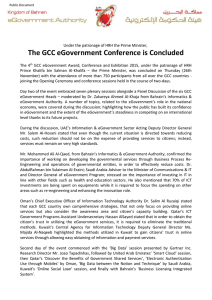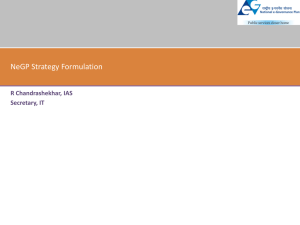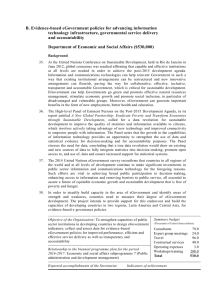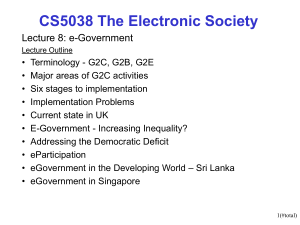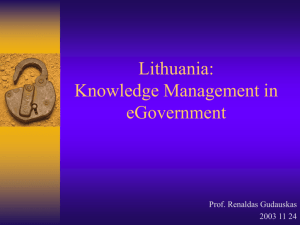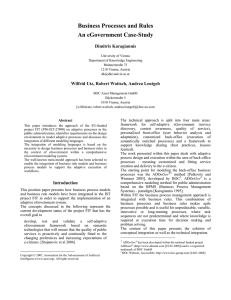Document
advertisement
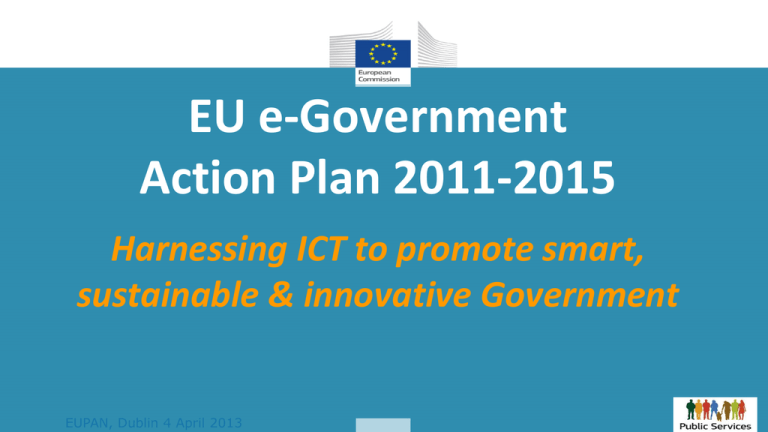
EU e-Government Action Plan 2011-2015 Harnessing ICT to promote smart, sustainable & innovative Government EUPAN, Dublin 4 April 2013 eGovernment Action Plan 2011-2015 • 4 Political Priorities; 14 priority areas; 40 specific actions • Supports the provision of a new generation of eGovernment services for businesses and citizens • Based on the Malmö Declaration, agreed on 18 November 2009 at the 5th Ministerial eGovernment Conference in Malmö, Sweden • Contributes to a knowledge based, sustainable and inclusive economy for the EU, as set forth in the Europe 2020 Strategy. • Supports and complements the Digital Agenda for Europe Key Targets by 2015 • 50% of citizens will have used eGovernment services (42% in 2010) • 80% of businesses will have used eGovernment services (75% in 2010) • A number of key cross-border services will be available on-line The 4 Political Priorities • • • • Empower citizens and businesses Reinforce mobility in the Single Market Enable efficiency and effectiveness Create the necessary key enablers and pre-conditions to make things happen Priority 1: Empower citizens and businesses (14 actions) • Services designed around users needs and Inclusive Services • Collaborative Production of Services • Re-use of Public Sector Information • Improvement of Transparency • Involvement of citizens and businesses in policy Priority 2: Reinforce mobility in the Single Market (10 actions) • Seamless Services for Businesses • Personal Mobility • EU-wide implementation of crossborder services and new services Priority 3: Efficiency and Effectiveness (7 actions) • Improving Organisational Processes • Reduction of Administrative Burdens • Green Government Priority 4: Key enablers and preconditions (9 actions) • Open Specifications and Interoperability • Key Enablers • Innovative eGovernment Digital Agenda for Europe and eGovernment Action Plan adopted May 2010 adopted Dec 2010 14 actions 40 actions 101 actions Digital Single Market Interoperability and Standards DAE, 8 pillars Trust and Security User empowerment Fast and ultra fast internet access Research and innovation Digital literacy, skills and inclusion eGov Action Plan Efficiency and Single Market Effectiveness ICT-enabled benefits for EU society - eGovernment- Pre-conditions International aspects Self-Assessment for the Implementation of the eGovernment Action Plan 2011-2015 Scope of the Self-Assessment is to • collect information regarding the implementation progress of the actions of the eGovernment Action Plan 2011-2015 Results allow to • indicate progress and • identify areas where lack of progress or serious delays are occurring 25 2012 Self-Assessment: MS progress overview (24 actions) 20 15 10 5 0 AT BE BG CY CZ DE DK EE EL ES FI FR HU IE IT LT LU LV MT NL PL PT RO SE SI SK UK NO Mid-Term Evaluation of the EU eGovernment Action Plan 2011-2015 • This evaluation will provide preliminary answers to how well is the EU progressing towards the realisation of the Malmö vision. The review will consist of: • 1. An assessment of the progress made on the different actions, both by Member States and by the EC. • 2. An estimation of the impact of the Action Plan on the development of eGovernment in individual Member States (policy, organisational and financial impact). • 3. Recommendations for action during the remainder of the Action Plan, but also for any future initiative. • Results available end 2013 Mid-Term Evaluation of the EU eGovernment Action Plan 2011-2015 Progress assessment: • Web platform • Pre-filled by contractors in coming weeks. • Mid-March collaborative data collection phase where MS/EC validate, add where necessary • Builds on first self-assessment exercise • Compatible and complementary to DAE Dashboard • "Live" platform, MS can update More information Websites • http://ec.europa.eu/digital-agenda/en/digitallife/government

